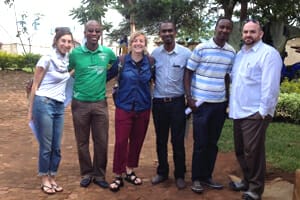News > Blog
Global Communities Partners with American University Capstone Program in Rwanda
Published 06/26/2014 by Global Communities

Global Communities partners with American University Capstone Program to Evaluate Factors Impacting Household Economic Resiliency
Courtney Lane Greenley and Shayna McCready, American University Master’s Candidates Contribute to Research in Rwanda
The evaluation team was comprised of AU Master’s Candidates Courtney Lane Greenley and Shayna McCready along with Global Communities staff from Rwanda and headquarters.
Developing economic resiliency at the household level is a complicated process, but some families are better able to progress than others. Why is that? What are the factors that affect families and how can Global Communities’ programs better address these factors/problems to help more effectively?
USAID-funded Higa Ubeho (“Be determined and live”) program has been providing assistance to Rwandan families since 2009. Reviews of the program’s effectiveness in building resilience at household level have been conducted periodically, and revealed shifts in resilience trends. To better understand them, Global Communities partnered with the American University (AU) Capstone Program to look specifically at a small number of beneficiary families that experienced negative shifts in spite of assistance provided through the program, and to probe deeper into factors that affected them.
The AU evaluation team developed a qualitative assessment to identify factors influencing economic resiliency. Over the course of spring semester 2014 including one week in Rwanda, the AU team conducted a critical instance impact evaluation through 23 in-depth interviews with household program beneficiaries and key informants in four districts. The data collected from the interview process was used to produce a report with recommendations for future programming.
Particularly useful for practitioners, the report offers suggestions for mitigating adverse household economic resiliency trends through specially tailored program services for vulnerable families.
The majority of households included in the sample showed that they have either maintained their economic status or have moved upward from a lower level. Yet, the evaluation also shows that nearly all participating households still face difficulties in some key areas, especially for those respondents categorized as ‘households in destitution.’ When these households experience a sudden shock (such as job loss, death or illness of a household member, crop failure), these external factors, can and often do prove too overwhelming for some of program beneficiaries to overcome. While the findings are highly contextual for the categorized households, the report discusses broader influencing factors of household economic resiliency and provides the evaluation team’s recommendations for improving Global Communities’ future projects.
